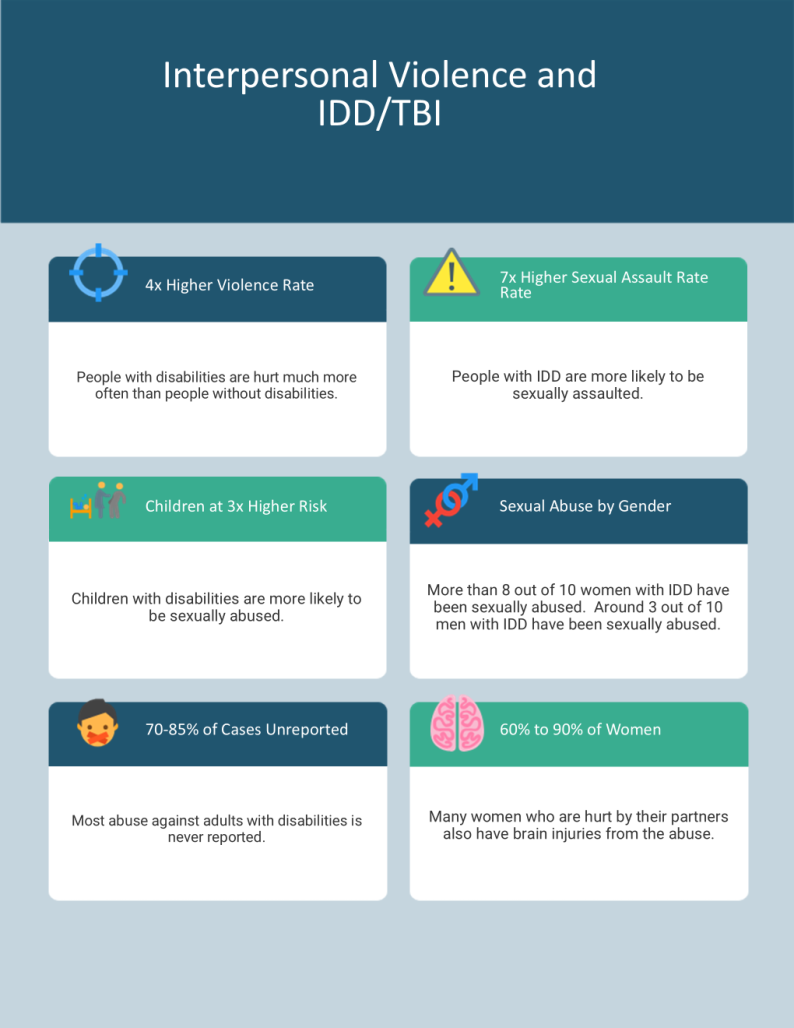Interpersonal Violence Resource Hub for People with IDD/TBI
Leave this website safely.
To leave this site quickly, press Ctrl + W ( for Windows/Linux) or Command + W (for Mac) on your keyboard. Learn more about internet safety and remember to clear your browser history after visiting this website.
If you are in immediate danger, call 911.
The information on this webpage supports people with intellectual and developmental disabilities (IDD), as well as their families, caregivers, and support workers. Our goal is to help stop and prevent interpersonal violence (IPV).
People with IDD and traumatic brain injury (TBI) are more likely to experience abuse, neglect, or exploitation. They often face extra challenges getting help, being believed, or getting justice.
NCDHHS is committed to offering easy-to-understand, trauma-informed information and tools. These resources are here to help people with IDD or TBI stay safe, speak up and get support. Whether you’re looking for help, education, or ways to prevent violence, we are here for you.
If you or someone you know is a victim of IPV or domestic violence and needs help, go to the NC Coalition Against Domestic Violence. You can also call the National Domestic Violence Hotline any time, day or night at: 1-800-799-7233, or TTY: 1-800-787-3224 (for people who are deaf or hard of hearing).
If you or someone you know is a victim of sexual assault and needs help, find resources and rape crisis centers in your area on the NC Coalition Against Sexual Assault website. You can also call the National Sexual Assault Hotline any time, day or night at: 1-800-656-4673, or Text: 64673.
If you need emotional support, you can reach out to the 988 Suicide and Crisis Lifeline. Call or text 988 24 hours a day, seven days a week. You are not alone, and help is available.
Interpersonal violence (IPV) is an umbrella term for different types of violence. It happens when a person or small group uses power or control to harm others.
Interpersonal violence (IPV) can include:
- Physical harm
- Sexual harm
- Emotional or psychological harm
- Neglecting or keeping someone from getting what they need
- Financial exploitation
This harm can come from a family member, caregiver, partner, friend, or someone else. This harm can happen to anyone, of any gender or age. It can happen at home, school, work, or in the community.
When the harm is on purpose, this violence is called abuse.
There is often confusion between the terms interpersonal Violence and Intimate Partner Violence.
Interpersonal violence is a broad term that covers violence and abuse in all types of relationships, including with family, friends, and strangers.
Intimate partner violence is a specific kind of interpersonal violence that only happens between people who are in a close relationship, such as a dating partner or a spouse.

- People with disabilities are 4x more likely to get hurt than people without disabilities.
- People with IDD are 7x more likely to be sexually assaulted.
- Children with disabilities are 3x more likely to be sexually abused, especially if they have IDD.
- More than eight out of 10 women with IDD have been sexually abused. Around three out of 10 men with IDD have been sexually assaulted.
- Around 70-85% of cases of abuse against adults with disabilities are never reported.
- Around 60% to 90% of women who have been hurt by partners also have brain injuries from the abuse.
Citations
People with intellectual or developmental disabilities (IDD) and traumatic brain injuries (TBI) face a higher risk of being harmed and abused. It can also be harder to get help. This happens for a few main reasons, including:
- Some people have incorrect and hurtful ideas about people with disabilities, thinking they can’t make their own choices. This makes it easier for abusers to harm them, believing they can get away with it.
- Many people with disabilities are taught to always do what they're told.
This makes it easier for abusers to control them. - Many people with disabilities may be lonely or separated from others. This makes it easier for violence to happen without anyone knowing.
- It can be hard to find services that are set up to help people with disabilities. They might not have transportation, or the services or places they need to go are not available.
- Many people with disabilities have not had sexual health or relationship education. This makes it hard to recognize or report when they are being abused.
- Sometimes, people with disabilities are not believed when they report harm or abuse. They may be scared to speak up because no one will believe them, or it could make their abuser hurt them more.
Learning about safety, healthy relationships and how to get help can make a big difference in preventing and stopping abuse.
The resources below offer helpful information about sexual health and preventing abuse. These resources include training programs, toolkits and other learning opportunities designed for people with IDD or TBI. NCDHHS does not endorse any specific organizations identified in the Interpersonal Violence Resource Hub.
IDD Resources
- Let’s Talk About It | NC Coalition Against Sexual Assault
- The Arc - Talk About Sexual Violence
- Sexual Health and Safety Education – Work Together NC
- Accessible Sexual Health
- Sex Ed. Instructors & Curriculum - Responsible Sex Education Institute (RSEI)
- Peer to Peer: Bridging the Gap Through Self-Advocacy Curriculum
- Sexuality for All Abilities Main - Mad Hatter Wellness
- Sexual Health Resources | OHSU
- Disability Justice and Violence Prevention Resource Hub – Created by Survivors of Violence with Disabilities for People with Disabilities
